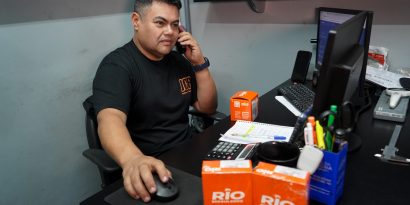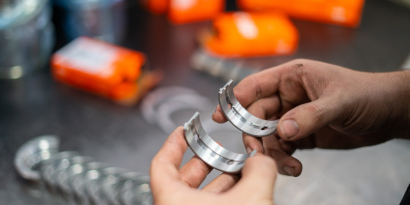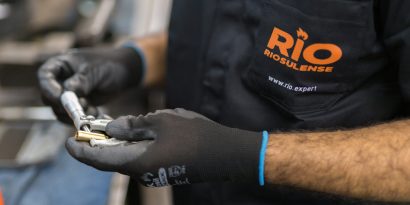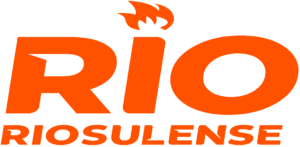Sustainable solutions in the automotive industry has moved beyond being a trend to become an urgent and vital commitment for the health of our planet. Companies across all segments, especially those connected to the metallurgical and automotive replacement parts sectors, are playing a key role in this transformation. Here at RIO, we not only follow these changes—we lead them.
In this article, you will learn about the main sustainable solutions we have adopted, which have become benchmarks in Brazil and around the world.
Why is sustainable solutions essential in the automotive industry?
With increasing environmental concerns, reducing the impact of industrial operations has become mandatory. Metallurgy, by its very nature, is a resource-intensive sector. However, by adopting innovative technologies and conscious practices, it is possible to significantly reduce environmental impact—benefiting companies, consumers, and the environment alike.
Check out some of the initiatives we are implementing and promoting in the market below.
Key sustainable solutions adopted in the automotive and metallurgical industries.
1. Additive manufacturing (3D printing)
Additive manufacturing, or 3D printing, has revolutionized the metallurgical industry—especially in the production of prototypes for automotive parts. This technology enables:
- Reduced raw material consumption;
- Less waste in the prototyping phase;
- Lighter and more efficient components.
RIO, a pioneer in this field, has a prototyping factory that adopts this technology, ensuring less waste of natural resources and energy savings.
2. Optimization of production processes
In our pursuit of sustainability, energy efficiency is fundamental. We have adopted leaner production processes, reducing both energy use during casting and water during cooling. This results in:
- Lower carbon footprint;
- Reduced operational costs;
- Smarter and more conscious use of raw materials.
3. Sustainable materials and innovative alloys
The automotive sector has started using lighter and more durable metal alloys, reducing natural resource consumption and pollutant emissions throughout the parts’ lifecycle. At RIO, we constantly invest in material innovation, ensuring greater resistance and less environmental impact.
4. Conscious waste management (3Rs)
With a solid 3Rs policy (Reduce, Reuse, Recycle), at RIO we have managed to significantly decrease the waste sent to landfills, reusing materials such as foundry sand and wood. Additionally, we run a robust reverse logistics program, with 50% of our packaging being recycled—well above the Brazilian legal requirement of 30%.
5. Water and effluent treatment and reuse
Water is essential in the metallurgical sector, and here at RIO we have implemented comprehensive structures for treating, reusing, and preserving this resource, such as our Water Treatment Stations (WTS) and Effluent Treatment Stations (ETS). This ensures that our operations are environmentally responsible.
Advanced sustainability at RIO: Additional actions reinforcing our ESG commitment
Our commitment goes far beyond the basics. Check out some of RIO’s advanced and pioneering initiatives:
Continuous environmental monitoring & control
- Groundwater: we constantly monitor it to ensure there is no negative impact.
- Air quality: we conduct annual monitoring of atmospheric emissions to guarantee environmental quality and legal compliance.
Circular economy
In essence, the Circular Economy is a practice that connects companies so that the waste from one becomes the raw material for another, reducing environmental disposal and giving waste a new lease on life before it becomes unusable. Besides environmental benefits, both the company providing the waste and the one acquiring it from the direct partner can negotiate much more attractive prices, since there is no intermediary in the deal.
Within this context, RIO practices the Circular Economy for the Foundry Discarded Sand (FDS) generated in the casting process and sent for recycling by partners in compliance with Law nº 17.479/2018. Our main partner uses this sand in the manufacture of concrete products. Additionally, RIO also incorporates the Circular Economy in acquiring raw materials by utilizing residual scrap steel directly from a local partner, who provides their leftover steel sheets for our melting process.
All these actions seek to add value to waste, allowing it to remain in the supply chain, reducing natural resource consumption, supporting environmental preservation, and promoting smart waste allocation.
Renewable Energy Certificates (I-RECs)
Our sustainability commitment also involves clean energy. Since 2025, we have been acquiring international renewable energy certificates (I-RECs) every quarter—guaranteeing that 100% of our energy consumption is clean and renewable, completely eliminating Scope 2 emissions (indirect emissions from purchased energy). Learn more about each emissions scope on our blog.
Greenhouse Gas Emissions Inventory and Decarbonization
We began our Greenhouse Gas (GHG) Emissions Inventory in 2024, clearly identifying emission sources and developing strategies for decarbonization. This reduction is expected to reach 36% by the next inventory, although it will depend on energy consumption in 2025 with our current practices.
Zero waste by 2025
In 2025, we joined the “Zero Waste” program and began our certification process. Joining this initiative is fundamental to building a more sustainable future, driving an essential shift in the way we handle waste.
By joining, we actively commit to reduction, reuse, and recycling—beyond mere waste disposal. This strengthens the implementation of practices that minimize environmental impact, promote the circular economy, and encourage innovation in our processes and products.
Commemorative tree planting and collaborative actions
Since 2002, our employees have actively participated in commemorative planting of native trees, increasing environmental awareness and strengthening our commitment to biodiversity.
Next steps: RIO’s sustainable future
Our ESG journey is just beginning. The next steps are clearly defined:
- Zero Waste certification;
- Anticipate requirements such as the Carbon Border Adjustment Mechanism (CBAM) to maintain global competitiveness;
- Publish our first Sustainability Report aligned with IFRS S1 and S2 standards in 2025, preparing for 2026.
Every action counts toward a sustainable future!
By choosing partners like RIO, you support a more sustainable and responsible automotive industry—directly contributing to environmental preservation and a better future for everyone.
At RIO, we deeply believe that every initiative counts to reduce our environmental impact. We are committed to sustainable practices and technological innovation to ensure a cleaner, greener, and more responsible tomorrow.
Did you like these initiatives? Do you have suggestions or ideas? Share them with us in the comments and follow us on social media to stay updated on our sustainable actions and celebrate our 80 years of environmental responsibility with us!





